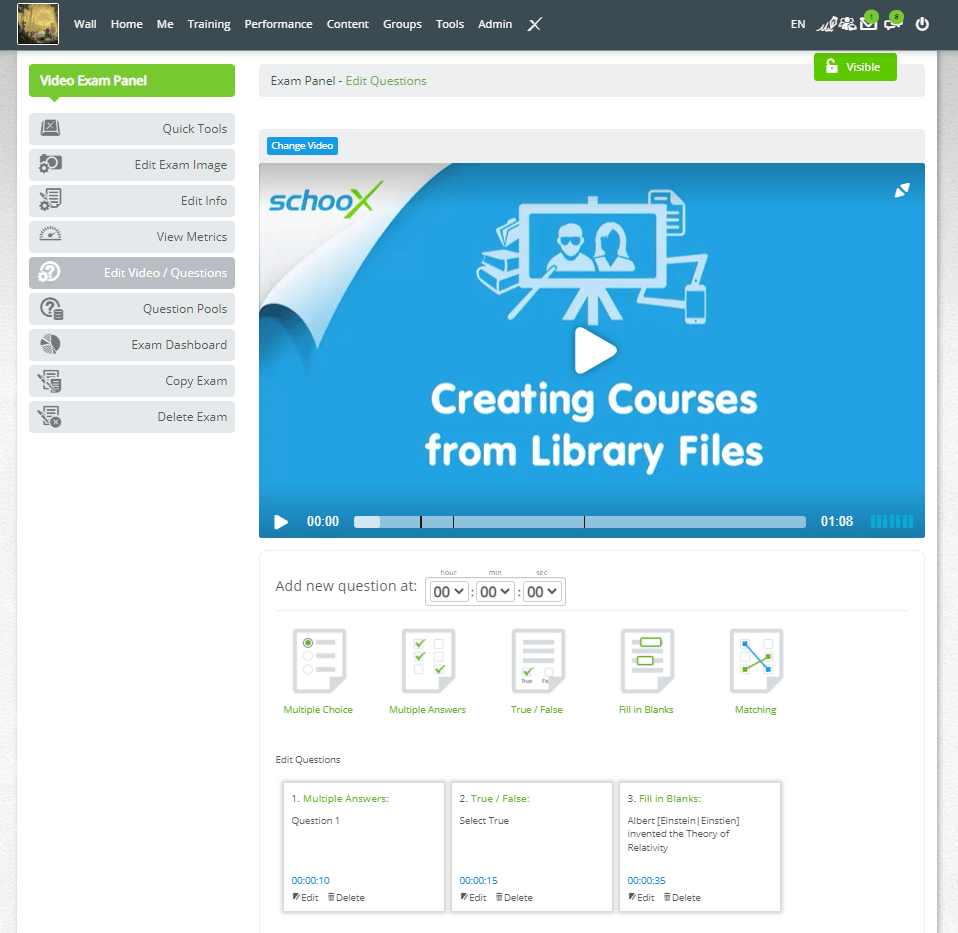December 22, 2021
4 Min. Read

Learning and development (L&D) professionals have long known the benefits of video learning, but do you know how video exams or video-based assessments can be leveraged as a knowledge retention tool? Before we answer that question, let’s revisit a brief history of video learning and consider some of its benefits.
Blended learning approaches have proliferated the corporate training space since the mid 90s, and mobile technology added to the boom throughout the 2000s.
The COVID-19 pandemic is now fueling another boom in blended learning. As non-essential businesses pivot toward remote work—as well as entire sectors of those considered essential—L&D teams have to get creative to onboard and train their employees. This trend is projected to continue as more businesses permanently shift toward partially or fully remote operations.
Video Learning: The Benefits
While few can argue the benefits of in-person instruction, it doesn’t make sense for every organization—especially those with distributed operations across multiple locations or large remote workforces.
In contrast to in-person training, video learning is more accessible, cost effective, and scalable.
Accessible: With video learning, companies can ensure all employees have access to the same information, even across distinct brands or distant geographies.
Digitally Native: Video training also tends to be preferred by younger employees and is quickly becoming the go-to training method for companies with geographically dispersed workforces.
Digestible: Learning is most effective in short, bite-sized chunks known as “microlearning.” Video learning enables L&D professionals to take a “YouTube-like approach” to training that is especially popular among younger employees.
Measurable: Schoox captures valuable data and analytics about video learning that can be leveraged to inform and improve overall L&D strategy.
Schoox Introduces Video Exams
For training to be effective, L&D professionals must be able to measure skills retention among employees, and employees must be able to perform those skills in real-time when on the job. The asynchronous nature of video training, however, makes it difficult to assess whether employees are really retaining the information provided; without a way to test employees for knowledge retention, business leaders have no way to determine whether training is effective.
With Schoox, L&D professionals can not only curate video training into valuable courses and curricula, but also standardize skills measurement and build dynamic assessments with our new feature—customizable video exams.
Video exams enable training managers to insert questions in multiple formats to assess employee retention at various checkpoints anywhere throughout the video. These exams can be created with any video in the content library. Questions can either be added manually or sourced from existing question pools to make the process even faster and easier to replicate.
Available question types include:
- Multiple Choice
- Matching
- Multiple Answers
- Fill in the Blank
- True or False
Schoox makes it easy for training managers to create customized video assessments without the need to use additional course creation software. This is especially useful for small teams looking to streamline training as much as possible without compromising on learning effectiveness.

Why Use Video Exams?
Video exams are a powerful way for businesses of all kinds to measure skills and knowledge retention among employees. Here are some common uses:
Knowledge Checkpoints
Create video exams to test employees on a one-time or recurring basis. A bar with a rotating seasonal drink menu, for example, can use the video exam feature to introduce and test employees on new menu items. Video exams can help test new hires on how well they understand core values or important business processes.
Compliance
Video exams make it easier to deliver required local, state, federal, and industry-specific compliance training. They’re also a more engaging way for employees to learn this critical information.
Scenario-Based Assessments
Video exams are a good way to test employees for skills retention on specific tasks or information—how to repair a certain item, for example. Video exams can be particularly useful for new hire orientations and employee onboarding.
Reporting
Video exams provide leaders with data that can be leveraged to inform L&D strategy and planning. Users with reporting permissions can create reports that indicate how many employees completed a particular exam, their scores, number of attempts, and more.
Custom-curated video exams are the perfect way for all kinds of businesses to disseminate highly specific knowledge sets to the right sectors of their workforce at scale. With access to the right information, employees can perform their jobs better and take greater ownership of their learning journey. For L&D professionals, video exams are an ideal way to deliver training, measure skills and knowledge retention, and derive actionable insights from results.
See video exams and other Schoox features in action—schedule a demo with us.



